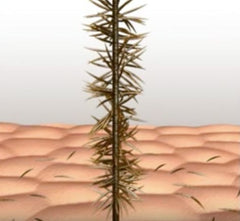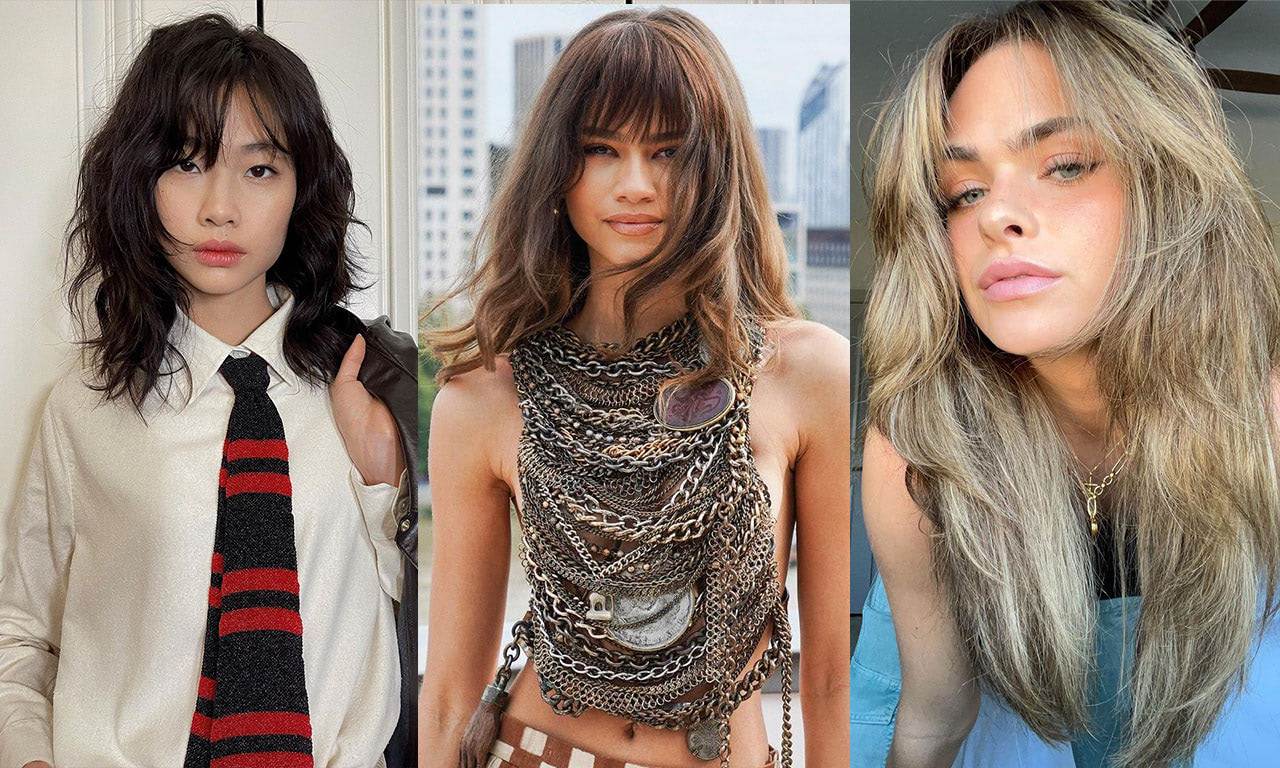For men and even women, the initial pattern and gradual loss of hair has lent itself to the rise of entire categories of volumizing & thickening haircare products and solutions. People looking to add back thickness, density and to conceal the loss of hair and decreasing diameter of hair follicles as they die off has created a new industry. While keratin hair fibers found their foothold in the market, there has been much discussion and history about non-invasive hair loss solutions.
The Earliest Indications Lend Themselves to Concealers
In 1982, Good Looking Hair enters the market. The product may have been profitable, but it also shared the dubious distinction of being ranked #13 on Time Magazines list of “The 50 Worst Inventions.” The aerosol was messy, the result was unnatural, and the product was lampooned as it was essentially spray paint for the scalp. It offered concealment, but it didn’t create realistic volume and texture. 
Concealers however are best used when clients are in the initial stages of hair loss, as the products are designed to cling to and build onto hair and almost invisible finer hairs on the scalp. They are ideal for men and woman with particular hair loss patterns., but there are both similarities and differences when it comes to male and female hair loss.
• FACT: 25% of men at age 25 are already losing their hair.
• FACT: 40% of men have noticeable hair loss by age 35. By age 60 that number rises to 65%.
• FACT: 30% of men age 50 to 59 experience symptoms of andropause, or “testosterone deficiency syndrome”
Male hair loss
- Age: May start as early as their teens, but more aggressive hair loss happens in their 40s and 50s.Two-thirds of American men experience hair loss by age 35.
- Signs of male hair loss: Starts with a receding hairline and thinning of hair around the crown.
- Common causes of male hair loss: Androgenetic alopecia and telogen effluvium, stress, nutrition.
- Emotional impact: In some senses, it’s more socially acceptable for a man to have hair loss or be bald. However, men can also feel shame though as hair is tied to masculinity and strength.
- How many men suffer?: 50 million men experience hair loss.
Female hair loss
- Age: Can begin as early as 20s and 30s, but most common for women around age 45 – 55. 50% of women experience hair loss by age 50.
- Signs of female hair loss: Thinning of hair in the middle area of the scalp or a slow widening of the part.
- Common causes of female hair loss: Androgenetic alopecia, telogen effluvium, hormone changes after menopause, stress, nutrition.
- Emotional impact: More difficult for women as hair loss is tied to femininity and beauty. Women can feel less attractive with hair loss.
- How many women suffer?: 30 million women experience hair loss, making up 40% of hair loss sufferers in the United States.

Hair Fillers as A Minimally Invasive, Cost-Effective Solution
The greatest benefit of hair fillers and concealers is their low cost of entry to achieve immediate benefit to the sufferer. No different than buying skincare or cologne, it allows both men and women to manage the cost/lifestyle impact their condition has upon their finances at the early stages. It also offers no impact on health (medications) or safety (hair plugs) and is discrete with proper placement.
“I remained anguished about the prospect of being bald for the next 20 years as my hairline retreated and my hair steadily thinned. Bald men seemed disfigured to me. I felt pity for them, so I tried to disguise my own condition by keeping my own hair clean and fluffed with a blow dryer. That hardly qualified as a treatment for baldness, but no other options seemed viable. I recoiled from the cost and the upkeep of a hairpiece. Minoxidil didn't seem to work very well. Hair plugs looked awful - one man I met looked as if he had been burned several times on the top of his head with a cigarette and each spot had sprouted a tuft of hair.”
– Tom Valeo, staff writer, Men’s Health
For men already noticing the condition, not having an affordable solution, or the anxiety of seeking out solutions directly leads to loss of quality of life.
“Being shy already, I didn’t feel I could confide in anyone and it began to affect my confidence. By the time I was 28 I stopped going out with my mates as often, as I felt so self-conscious. If I saw a rare picture of myself that someone had taken without me knowing…I’d cringe. Throughout my late 20s I did my best to cover up my baldness by keeping my hair in a mop-head style, while secretly trying everything I could – caffeine shampoos, hair growth supplements and lotions – but none of them worked.”
- Michael Whitaker, 2019 Interview for The Sun Newspaper
The Issue with Modern Hair Concealers
Because of the unique perceptional challenges that STILL plague this product category since the GLH-9 launch, there are some key focus points and challenges that need to be addressed up front and mitigated:
- Cheap, talc-based formulations in powder or liquid form are NOT discrete and are essentially paint-on hair. Further, talc that is commonly used in baby powder and more recently has found its way into dry shampoo products can lead to a variety of complications. Overuse of the product can clog hair follicles, leading to folliculitis, a bacterial or fungal infection in the hair follicle.0F1 While talc on its own doesn’t lead to hair loss, studies do show that poor scalp health can cause hair loss.1F2 When hair emerges from a follicle that’s been damaged by a bacterial or fungal infection, the hair fiber isn’t anchored firmly inside the follicle. The new hair is more likely to fall out, leading to even more hair loss.
- Cheap liquid-based aerosol concealers utilize iron oxides, but they also talc that create the illusion of thickness by building up on themselves and acting as the structural “fiber”. As the liquid dries off, the powder remains, but the finish is highly unnatural looking. Often this will cling to the scalp instead of any remaining fine hairs, formally an unnaturally uniform matte layer that looks shiny and more like shoe polish.
Cheap liquid-based aerosol concealers utilize iron oxides, but they also talc that create the illusion of thickness by building up on themselves and acting as the structural “fiber”. As the liquid dries off, the powder remains, but the finish is highly unnatural looking. Often this will cling to the scalp instead of any remaining fine hairs, formally an unnaturally uniform matte layer that looks shiny and more like shoe polish.
Currently the American Cancer Society is encouraging people who are concerned about the risk of cancer to avoid using talc-based products until more research has been done.

The Best Non-Invasive Solution
Perfect Locks™ Hair Fibers offer you a cost effective and instant benefit hair loss solution for thinning hair. Regardless of the root cause of thinning hair, from Alopecia to naturally genetic hair loss.Perfect Locks™ Hair Fibers help to disguise thinning areas of the head, no matter what or where your hair loss pattern is. They are designed to cling to and work remaining hair, building back fullness, thickness and density by clinging to that hair. They are feather light in weight, not straining your existing and fragile thinning hair.
The Solution In Summary
- QuickFix utilizes naturally occurring iron oxide of the same quality found in mineral based cosmetics. These minerals naturally vary in color from orange, red, yellow and black and allow for natural pigmentation of our concealers without the use of artificial colorants.

- Gaining back your density and volume should be as fast as it is cost effective. Stop hiding under hats, get out of the house with friends, family and loved ones. Hair solutions should never be paralyzing to your lifestyle or your bank account.
- The solutions you seek for hair loss shouldn’t make that hair loss worse. Goopy, scalp choking liquid sprays and clumping, follicle clogging talc-based products belong in the 90s or the nearest landfill. Hair concealers born of the earth, made with natural minerals should and are the standard of a new era.
- Real hair is the only thing that can look LIKE real hair. While other concealers or “hair in a can” utilize talc or fibers of who knows what, utilizing real keratin hair building fiber products of the same genetic and compositional profile of your real hair. It looks like the real deal, because it’s made with the real deal.
 Have Questions? Call Us!
Have Questions? Call Us! 


